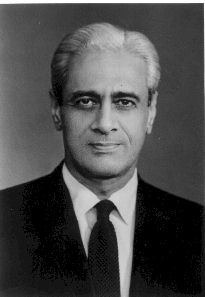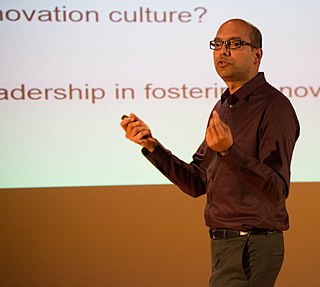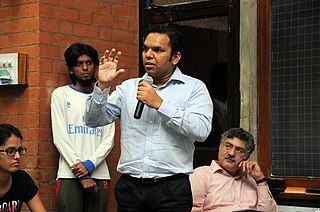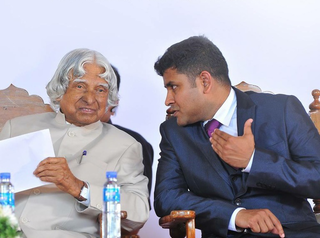
Avul Pakir Jainulabdeen Abdul KalamBR was an Indian aerospace scientist and statesman who served as the 11th president of India from 2002 to 2007. He was born and raised in Rameswaram, Tamil Nadu and studied physics and aerospace engineering. He spent the next four decades as a scientist and science administrator, mainly at the Defence Research and Development Organisation (DRDO) and Indian Space Research Organisation (ISRO) and was intimately involved in India's civilian space programme and military missile development efforts. He thus came to be known as the Missile Man of India for his work on the development of ballistic missile and launch vehicle technology. He also played a pivotal organisational, technical, and political role in India's Pokhran-II nuclear tests in 1998, the first since the original nuclear test by India in 1974.

Satish Dhawan was an Indian mathematician and aerospace engineer, widely regarded as the father of experimental fluid dynamics research in India. Born in Srinagar, Dhawan was educated in India and further on in United States. Dhawan was one of the most eminent researchers in the field of turbulence and boundary layers, leading the successful and indigenous development of the Indian space programme. He succeeded M. G. K. Menon, as the third chairman of the Indian Space Research Organisation (ISRO) in 1972. The second launch pad of ISRO, Satish Dhawan space centre is named after him. He is greatly regarded as the man behind A. P. J. Abdul Kalam.

Raghunath Anant Mashelkar,, also known as Ramesh Mashelkar, is an Indian Chemical Engineer, born in a village named Marcel in Goa and brought up in Maharashtra.

The Thangal Kunju Musaliar College of Engineering, commonly known as TKMCE, is the first government-aided engineering institution in the Indian state of Kerala, with foundation stone laid on 2nd February 1956, and inaugurated on 3 July 1958. The campus is located in Karicode, approximately 6 kilometres (3.7 mi) away from Kollam, Kerala, India. The college was affiliated to Kerala University before getting changed to APJ Abdul Kalam Technological University when it was formed in 2015. UGC conferred autonomous status to the institution in 2022.

Laxmi Mall Singhvi was an Indian jurist, parliamentarian, scholar, writer and diplomat. He was, after V. K. Krishna Menon, the second-longest-serving High Commissioner for India in the United Kingdom (1991–97). He was conferred with a Padma Bhushan in 1998.

Jugaaḍ is a colloquial word in Indo-Aryan languages, which refers to a non-conventional, frugal innovation, often termed a "hack". It could also refer to an innovative fix or a simple work-around, a solution that bends the rules, or a resource that can be used in such a way. It is also often used to signify creativity: to make existing things work, or to create new things with meager resources. It can be compared to the French term bricolage, although the two concepts do not precisely correspond.
Federal Institute of Science And Technology (FISAT) is a private engineering college and business school in Mookkannoor, Kerala, India, run by the Federal Bank Officers' Association Educational Society (FBOAES), established in 2002. It is an initiative of the Federal Bank Officers' Association (FBOA), the organisation representing the officers of the Federal Bank. FISAT is accredited by NBA and NAAC.

Jaideep Prabhu is the Jawaharlal Nehru professor of business and enterprise at the Judge Business School at the University of Cambridge, England. The Professorship was established by the Government of India with an endowment of £3.2 million. Prabhu is also the director of the Centre for India & Global Business (CIGB). He is the co-author of Jugaad Innovation: Think Frugal, Be Flexible, Generate Breakthrough Growth, described by The Economist as "the most comprehensive book" on the subject of frugal innovation.
Indovation is the process by which innovations are developed in India to serve a large number of people affordably and sustainably in response to conditions of scarcity and diversity. The individual solutions generated by this process are called indovations. The key idea is that poverty is the mother of innovation: reduced circumstances lead to increased effort, creativity and productivity, as reported in the practice of Jugaad among India's rural poor. Examples of indovations include the Tata Nano, the Tata swach water filter, Devi Prasad Shetty's affordable cardiac care hospital, the SELCO's solar lighting solutions for consumers off the electricity grid and The First Identified Inexpensive Solar Water Filter that was designed and invented by Shripad Krishnarao Vaidya, of Nagpur, Maharashtra, India on 23 April 2010. The Specialty of the water filter is Capillary Pumping Technique.
Navi Radjou is an Indian born scholar and an innovation and leadership advisor based in Silicon Valley. He is a Fellow of Judge Business School at the University of Cambridge and has spoken and written widely on the theme of frugal innovation.

Srijan Pal Singh is an Indian author, public speaker and social entrepreneur. He was born and raised in Lucknow, Uttar Pradesh.

Yagnaswami Sundara Rajan or Y. S. Rajan is an Indian professor, scientist and administrator. He is Honorary Distinguished Professor in Indian Space Research Organisation. He has made major contributions to various aspects of management of science, technology and innovation. In 2012, he was awarded with Padma Shri for his contributions in science and engineering. He is one of the well known scientists who has closely worked with Abdul Kalam, former President of India.

Sivan Kailasavadivu is an Indian aerospace engineer who served as the Secretary of the Department of Space and Chairman of the Indian Space Research Organisation(ISRO) and Space Commission. He has previously served as the Director of the Vikram Sarabhai Space Center and the Liquid Propulsion Systems Centre.

The Dr. A. P. J. Abdul Kalam Award, named after the 11th President of India and aerospace scientist A. P. J. Abdul Kalam, is awarded by the Government of Tamil Nadu in recognition of contributions on scientific development, humanities and students' welfare.

Arun Kumar Tiwari is an Indian missile scientist, author, and professor. He has written several books and co-authored 5 books with Dr. APJ Abdul Kalam, including Wings of Fire, the autobiography of Dr. APJ Abdul Kalam, former president of India. Published in 1999, Wings of Fire has become a modern classic with over 30 reprints selling over a million copies and was translated into 18 languages.
Eknath Vasant Chitnis is an Indian space scientist and a former member secretary at the Indian National Committee for Space Research (INCOSPAR), which evolved into the present-day Indian Space Research Organisation (ISRO). He is also a former director of Space Applications Centre of ISRO and a former colleague of APJ Abdul Kalam, the erstwhile president of India. The Government of India awarded him the Padma Bhushan, the third highest civilian award, in 1985.

Thoppilthodi Raheem Shamsudheen is an Indian educationist, film producer and technocrat. He is best known for producing the Malayalam movie 1983 and the 2018 Malayalam movie Queen. Besides his contributions to film, Shamsudheen is the chairman of the Cochin College of Engineering and Technology and Cochin Institute of Science & Technology. He is also an angel investor and technologist and is involved with multiple technology start-ups and media-related technology solutions.
Jyoti Jayant Gogte is an Indian entrepreneur and academician, most notable for her reference textbooks on entrepreneurship titled Startup & New Venture Management (2014) and Roadmap for an Entrepreneur (2024).
Dara Pirojshaw Antia (1914-1999), was a metallurgical engineer, researcher and business executive, who founded the Indian Institute of Metals. Antia was born into a Parsi family in Bulsar and was the seventh child in a family of nine children. Antia obtained a bachelor's degree in science from the Banaras Hindu University and a doctorate from the Massachusetts Institute of Technology, and was also an alumnus of the Advanced Management Programme at Harvard Business School. He was named by the Government of India as Director of Metals from 1946-50, during which period he founded the Indian Institute of Metals. Antia also co-founded the Journal of Alloy Phase Diagrams and Journal of Phase Equilibria, and was a recipient of the Henry Marion Howe Medal, awarded by the American Society for Metals, in 1945. Antia later served as deputy managing director of Union Carbide and played an important role in its expansion across India. Antia was also a Ranji Trophy cricketer and a member of the All India Council for Technical Education.

The "Dr. A. P. J. Abdul Kalam National Memorial" is a mausoleum in memory of A. P. J. Abdul Kalam (1931–2015), the 11th President of India (2002-2007), located in his home town, Rameswaram, Tamil Nadu, India. The memorial was designed and constructed by Defence Research and Development Organisation (DRDO) as a tribute to Kalam and to display the cultural heritage and ethnic diversity of India. It was officially inaugurated by Prime Minister Narendra Modi in July 2017. A symbol of national integration, the memorial is an amalgamation of Mughal and Indian architecture.














